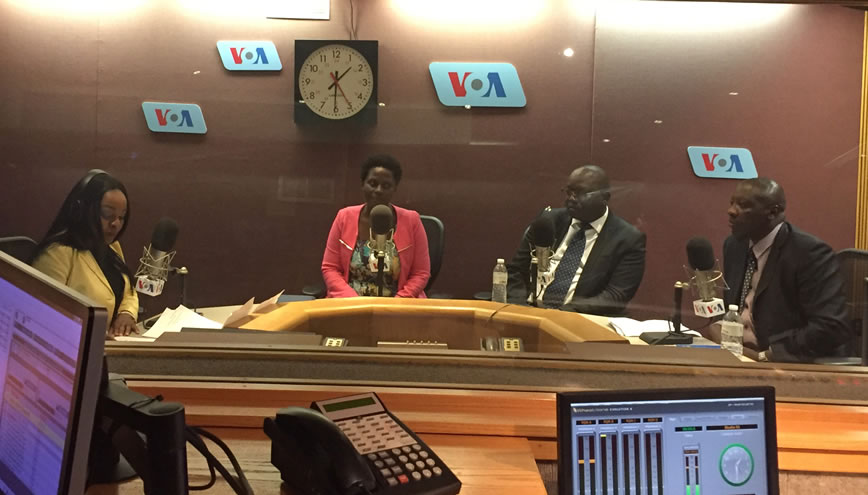
A VOA reporter interviews Ruth Kigozi, Dr. Jimmy Opigo, and Byoona Eriachim Ntairaho during their trip to Washington DC.
“Today I stand here as a witness, and to put a human face on what we are doing here, but specifically to say a big thank you, ” Dr. Jimmy Opigo said. He acknowledged U.S. malaria support through PMI, the Global Fund, Department of Defense, and National Institutes of Health.
Since 2006, Uganda has been a PMI partner country receiving funding and technical assistance. In that time, Uganda has seen a 45-percent growth in population at risk of malaria but a 30-percent decrease in malaria cases, and a 57-percent reduction in malaria deaths across all ages. Even more encouraging is Uganda’s 70-percent reduction in deaths attributable to malaria in children under five, according to the 2018 World Malaria Report.
In the reception’s closing remarks, Opigo talked about his own experiences with malaria both as a patient and as a medical doctor in a country susceptible to malaria year round. He also described Uganda’s own governmental commitments to fighting the disease, specifically through a new president’s fund for malaria and the Uganda Parliamentary Forum on Malaria.
“We are aware that this is our problem. You have simply come to help us. It is our responsibility to get rid of malaria and we are very committed to it.” he said. “Our country has taken this fight forward.
The malaria reception was one of several engagements for Opigo and his colleagues during a whirlwind trip to Washington, DC, to talk about the impact of PMI investment in Uganda and Uganda’s success in fighting malaria. Opigo was joined by Ruth Kigozi, monitoring, evaluation and learning specialist for PMI’s Malaria Action Program for Districts (MAPD), and Byoona Eriachim Ntairaho, headmaster of the Walyoba Primary School.
Together the three went on Health Chat, a Voice of America radio program hosted by Linord Moudou for an African audience. The conversation centered on PMI’s support in Uganda through MAPD and the country’s approach to both protect children in schools and turn children into community change regarding malaria prevention and treatment.
Listen to the entire conversation below or click here
“In a malaria-endemic place like Uganda, a child can have over 10 bouts of malaria in a year, and in each of these situations they lose one week of school,” Opigo said. “So we thought one action to promote education is to protect children from malaria.”
Malaria Smart Schools like Walyoba Primary provide students with insecticide-treated bed nets and access to malaria tests and medication. In addition, malaria is incorporated into the educational curriculum, classroom set-up and routines, and extracurriculars like a drama groups that perform throughout the community to teach others about malaria prevention and treatment. This serves the country’s overall strategy to create a culture of malaria prevention from an early age so that Ugandans have a lifelong culture of malaria-safe practices.
Opigo and Ntairaho also talked about the Malaria Smart Schools and PMI on Africa 54, a Voice of America television program. Watch the video below or click here.
Thank you to our colleagues for sharing their story and making the long journey from Uganda to Washington, DC.
To learn more about Malaria Smart Schools, see this multimedia story on USAID Medium.
